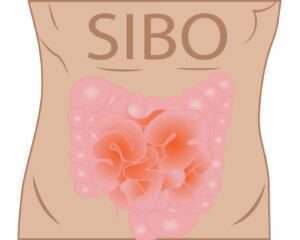
El SIBO (Small Intestine Bacterial Overgrowth) es un trastorno de malabsorción caracterizado por una disbiosis en el intestino delgado, principalmente debida a una proliferación patológica de bacterias colónicas fuera de su localización habitual. Las causas de padecer un SIBO, son muy variadas, desde causas mecánicas como; un vólvulo, tumor, adherencias postquirúrgicas, a enfermedades sistémicas como son la diabetes, esclerodermia, amiloidosis, por trastornos en la motilidad: SII, obstrucción, miopatías… También puede ser resultado de una medicación, de opiáceos, antibióticos, antisecretores… o incluso a raíz de trastornos malabsortivos: IPE, cirrosis, intolerancias…
Entre los signos y síntomas que puede presentar un paciente con SIBO, destacan: distensión abdominal, diarrea/estreñimiento, meteorismo (gases), ruidos intestinales, dolor abdominal, esteatorrea (heces grasas), pérdida de peso/anemia, y otros síntomas extradigestivos como son la fatiga, cefaleas, eccemas, acné, etc.
El SIBO, a su vez, puede ser causa de otros trastornos, como son la inflamación de la mucosa intestinal, sensibilidad y alergias alimentarias, o déficit nutricional (vit B12, vit D, Fe).
En cuanto al tratamiento del SIBO, se debe realizar un abordaje integral, comenzando por el control de las posibles causas, ya sea por una patología de base, cirugía, etc., pasando por la evaluación de la necesidad de un tratamiento erradicador por medio de antibioterapia u otros métodos naturales coadyuvantes, y finalizando con la modificación de hábitos de vida, principalmente a nivel nutricional y de actividad física.
Es fundamental una correcta evaluación de la salud de la microbiota intestinal, ya que puede ser clave para muchos de los síntomas que puedes uno padece. Por ello, un diagnóstico adecuado y a tiempo puede ser la respuesta a muchas enfermedades y deficiencias. El test de aliento, es una de las técnicas mas utilizadas para saber si un individuo padece o no SIBO, ya que a diferencia de otras pruebas no es invasiva y su elevada sensibilidad y especificidad permite una mayor comodidad y rapidez de diagnóstico.